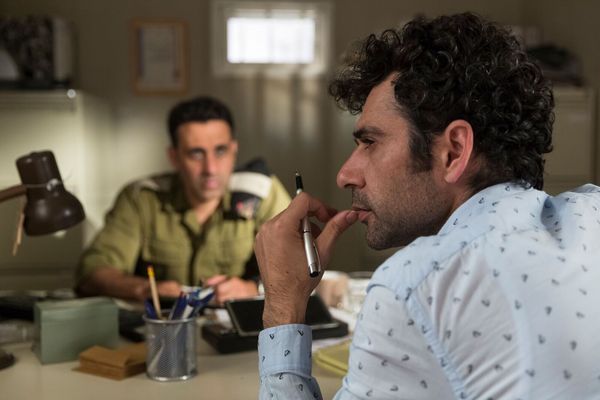Eye For Film >> Movies >> Tel Aviv On Fire (2018) Film Review
Tel Aviv On Fire
Reviewed by: Amber Wilkinson

Making a film about the making of a film, or in this case a TV show, is structurally difficult. A balance must be struck between the two worlds and there's no point in being clever if the end result lacks substance. Fortunately Sameh Zoabi proves himself more than able to handle alternate realities - putting them to excellent effect to explore the (all-too real) alternate realities that exist in present day Israel. He uses farcical comedy as his warm-hearted messenger, presenting his argument with a disarming hug and a surprising dash of romance.
His central character, Salam (Kais Nashif), seems more hapless than huggable to begin with. A Palestinian living in Israel, he's working as a production intern on the flamboyantly named Tel Aviv On Fire, a telenovela set in 1967 on the cusp of the Six-Day War. It's clear he's mainly there at his producer uncle's indulgence and his home-life is similarly scrappy, as he clumsily tries to reconnect with old flame Mariam (Maisa Abd Elhadi).

Cinematographer Laurent Brunet opens the pamper kit to flush the excerpts from Tel Aviv on Fire with heightened colours, gauzy lensing and deliberately sharp camera moves in contrast to the everyday naturalism of Salam's life. The overblown look is perfect for the pro-Palestinian melodrama, which stars Tala (Lubna Azabal) as femme fatale Arab woman Manal, who takes on the Jewish name 'Rachel' in order to set a honeytrap for Israeli military commander Yehuda (Yousef Sweid).
When Salam steps in to help with a spot of pronunciation trouble, he finds himself in an argument about the word "explosive" in the script - just one of many spot-on choices that Zoabi and co-writer Dan Kleinman go on to milk for full effect - and Tala takes a shine to his 'writing' skills. Suddenly elevated to the scripting crew, the panicking Salam finds an unexpected ally when he is hauled in for questioning at one of his daily journeys through an Israeli checkpoint by army commander Assi (Yaniv Biton). Assi - whose wife is a fan of the show, which noticeably has a following on both sides of the border - is desperate to be able to show off by giving her juicy titbits of the plot, and takes a look at the script, only to be horrified by its content. He quickly sets about advising Salam on how to make Yehuda a more dashing prospect and, while this initially gets the Palestinian out of a tight spot, Salam is soon caught between the plot aspirations of the pro-Jewish Assi and the show's pro-Palestine backers.
Zoabi amps up the absurdity levels as Salam tries desperately to find compromise, all the while showing how the script acrobatics and attitudes represent a microcosm for the wider societal strife, where any show of empathy for either side might be branded "anti-Semitic" or "Zionist" or where a wrong word at a checkpoint can lead to a day's lost work. The material is treated with a soft touch but finds time to offer comment on the way that attitudes and conflict can be passed down from generation to generation, letting neither side off the hook.
The story is multi-layered and crafty but Zoabi doesn't forget the heart of the matter, allowing a sort of odd couple bromance to brew between Salam and Assi, while ensuring the writer's romantic aspirations aren't left too long in the wings. His real achievement is in capturing the people rather than simply the politics, such as the way that Assi's desire to change the commander into a romantic hero is at least as much to do with impressing his wife by proxy as it is connected to dogma.
Is there a happy ending is, perhaps, less important than the question of whether there can even be a happy ending for everyone? As the credits roll, there's always hope.
Reviewed on: 05 Sep 2018














